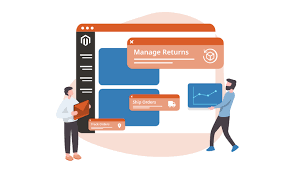In the current competitive e-commerce landscape, running a successful Magento store requires effective management strategies. This article outlines some of the best strategies for successful Magento store management, including integrating POS systems, using managed Magento hosting, implementing inventory and order management software, utilizing Magento extensions, and outsourcing marketing. By implementing these strategies, Magento store owners can improve their store’s functionality, increase efficiency, and drive more sales.
What Magento Store Management Means
Magento store management refers to the process of managing an online store that is built on the Magento platform. Magento is a powerful and flexible e-commerce platform that allows businesses to create and manage an online store with ease.
The store management process includes a wide range of tasks, such as managing products, customers, orders, payments, shipping, and inventory. It also involves ensuring that the store is up-to-date with the latest security patches and software updates, optimizing the website’s performance, and providing excellent customer service.
Some specific tasks involved in Magento store management include:
- Adding, removing, and updating products and product categories
- Managing customer accounts and order history
- Setting up and managing payment gateways and shipping options
- Monitoring and managing inventory levels
- Analyzing store performance through metrics like traffic, conversion rates, and average order value
- Ensuring the website is optimized for search engines and provides a seamless user experience
- Implementing security measures to protect against cyber threats and fraud.
Overall, Magento store management requires a combination of technical expertise and business acumen to ensure that the store runs smoothly and meets the needs of customers.
►►►► Please visit our products: Magento POS, BigCommerce POS, Shopify POS, Woocommerce POS, NetSuite POS, Mobile POS, White label POS, Reseller POS, POS System for Retail and Commercetools POS
Best Strategies for Successful Magento Store Management
POS Integration in Magento
One of the best strategies for successful Magento store management is POS integration. POS (point of sale) integration involves connecting your physical store or stores with your Magento eCommerce platform, allowing you to manage your in-store and online sales from a single system.
By integrating a POS system with Magento, you can streamline your operations and improve the customer experience. Here are some benefits of POS integration in Magento:
- Centralized Sales and Inventory Management: When you integrate your POS system with Magento, you can manage your in-store and online sales from a single system. This allows you to track sales and inventory levels in real-time, reducing the risk of overselling or underselling products. With centralized sales and inventory management, you can also make informed decisions about purchasing and restocking inventory.
- Improved Customer Experience: POS integration can help improve the customer experience by providing a seamless shopping experience between your online and physical stores. With a POS system, you can quickly and accurately process transactions, provide customer loyalty rewards, and offer buy online, pickup in-store (BOPIS) options.
- Increased Efficiency: POS integration can increase efficiency by automating many of the manual processes involved in managing sales and inventory. This can include automating purchase order creation and inventory restocking, reducing the time and effort needed to manage inventory levels.
Use Managed Magento Hosting
If you’re running a Magento store, using managed Magento hosting is an effective strategy for successful Magento store management. Managed hosting refers to a hosting service where the hosting provider takes care of most of the technical aspects of running a website, including server setup, maintenance, and security.
One of the main benefits of using managed Magento hosting is improved website performance. Managed hosting providers specialize in optimizing their servers to run Magento websites, which can enable you to improve your website’s speed and performance. This can translate into faster page load times, improved website speed, and reduced downtime, which can lead to a better user experience for your customers.
Another benefit of using managed Magento hosting is enhanced security. Managed hosting providers offer advanced security features like firewalls, malware scanning, and daily backups to help protect your website from cyber threats. This can provide peace of mind and enable prevent data loss or website downtime due to security breaches.
Inventory and Order Management Software
Another effective strategy for successful Magento store management is the use of inventory and order management software. Inventory and order management software can help you streamline your inventory management process, improve your order fulfillment efficiency, and reduce errors.
Inventory management software can support you keep track of your inventory in levels as orders are processed, and provide insights into which products are selling well and which are not. This can help you make more informed purchasing decisions and avoid overstocking or understocking products.
Order management software can manage your orders more efficiently by automating tasks such as order processing, invoicing, and shipping. This software can help you fulfill orders faster, reduce errors, and provide better customer service.
By automating inventory and order management tasks, you can save time and reduce the need for manual labor. This can help you reduce costs and improve your bottom line.
When selecting inventory and order management software, it is important to choose a solution that integrates seamlessly with Magento and provides the features you need to manage your inventory and orders effectively. Look for software that includes features like real-time inventory tracking, automated order processing, and reporting and analytics tools.
Use Magento Extensions to Save Time
Magento extensions can help you add new features and functionality to your store without having to build them from scratch. This can help you improve your store’s functionality and provide a better user experience for your customers.
It also can help you automate tasks and reduce the need for manual labor, which means you can save time and reduce costs. For example, you may use extensions to automate tasks such as order processing, shipping, and inventory management.
In addition, Magento extensions can be customized to meet your specific needs and requirements. This can support you tailor your store to your business and provide a more personalized experience for your customers.
Outsource Marketing
Finally, outsourcing marketing can be an effective strategy for successful Magento store management. Marketing is essential for driving traffic to your store and increasing sales, but it can be time-consuming and require specialized skills.
Marketing agencies have specialized skills and expertise in areas such as SEO (search engine optimization), PPC (pay-per-click), social media marketing, and email marketing. By outsourcing marketing, you can tap into this expertise and improve your marketing efforts.
Outsourcing marketing can be more cost-effective than hiring an in-house marketing team. Marketing agencies can provide a range of services for a flat fee or on a project basis, which can help you control costs and avoid hiring full-time staff.
Marketing agencies can support you scale your marketing efforts as your business grows. They can provide additional resources and support as needed, which can help you stay ahead of the competition and drive more sales.
Conclusion
Effective management is crucial for running a successful Magento store management. By integrating POS systems, using managed Magento hosting, implementing inventory and order management software, utilizing Magento extensions, and outsourcing marketing, store owners can improve their store’s functionality, increase efficiency, and drive more sales. By following these strategies, Magento store owners can stay ahead of the competition and achieve long-term success in the e-commerce industry. If you are concerned about this information, feel free to contact us.
Source: https://www.connectpos.com/best-practices-and-strategies-for-successful-magento-store-management/
►►►► Our related services: global supply chain, best ecommerce platform, b2b ecommerce platform, digital transformation projects, core banking platforms, digital banking platforms, case for cloud consulting analyst, ai throught the cloud, agentic ai, phần mềm quản lý doanh nghiêp, nền tảng quản trị doanh nghiệp, phần mềm nhân sự, phần mềm chấm công, phần mềm tính lương, phần mềm CRM, phần mềm KPI, phần mềm OKR, Phần mềm quản lý dự án, App chấm công, Cách tính lương, Ftrip Viet Nam, vietnam itinerary 2 weeks, north vietnam 2 week itinerary, northern vietnam 2 week itinerary, vietnam luxury tours, custom travel itinerary, best tour operators in vietnam, Vietnam Photography Tour, Photography Tour Guide Viet Nam

